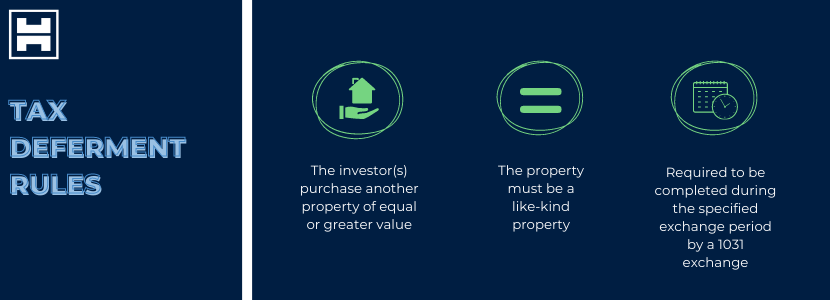The 1031 exchange is a very common topic being discussed and taught by commercial real estate brokerage. The 1031 exchange is named for the IRS tax code to which it pertains. This rule states that an investor who has made a profit from a real estate investment or taken depreciation tax credits can defer the tax on both if:
- The investor(s) purchase another property of equal or greater value
- The property must be a like-kind property
- Required to be completed during the specified exchange period by a 1031 exchange

A 1031 exchange is a very useful tool for real estate investor(s), especially when trying to leverage their rental properties. It allows you to unlock the equity and profits you have in your current property and roll those funds into other properties with more growth potential or diverse portfolio investment benefits.
Time Limits and Requirements
The 1031 exchange has strict rules that people must follow if they want to take advantage of it. Here are some of the large rules and regulations:
- The target replacement property must be identified within 45-days after the transfer of the relinquished property.
- The replacement property must be written in a document, received by a Qualified Intermediary (QI), signed by the taxpayers on or before the 45th day.
- The exchange period date may be extended by up to 180 days if the taxpayer identifies a replacement property within the designation period.

Examples of 1031 Exchange
A lot of leeway is provided by the IRS on what it considers “like-kind” properties. As long as you keep it relatively similar, you will get permission. For example, you can sell a duplex and purchase an apartment building as an example. With that said, the property must be used for business or investment purposes. If you purchase a property, flip it and start renting it out to tenants or using it as storage for your business, it would qualify for a 1031 exchange. You could move the proceeds of the first sale property into a new property investment that is for business purposes. On the other hand, if you purchase a property for a very low price, renovate it and sell for a profit, it wouldn’t qualify for a 1031 exchange. The IRS tax code states specifically that any property held for sale isn’t eligible for tax deferment.
Key Role of a Qualified Intermediary
A Qualified Intermediary, often known as QI, is a mandated requirement in every 1031 exchange, as per the IRS’ rules, and handles the exchange on behalf of the real estate investor(s). The QI must have citizenship of the United States and not be related, in any way, to the 1031 real estate investor(s). Preparation of all exchange documents and due diligence is handled by your QI. Once the sale of your relinquished property is complete, your QI will hold your proceeds in escrow until the transaction closes on your new identified property and the process is fully complete.
At Hinge, we are more than happy to help you with any of your commercial real estate, or 1031 exchange questions. Just give us a call at (615) 794-1411, or come in and see us!

Recent Comments